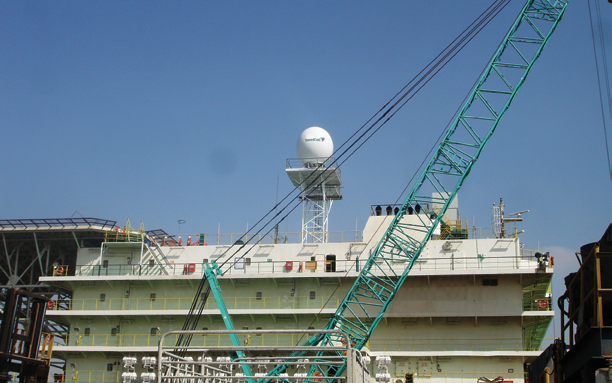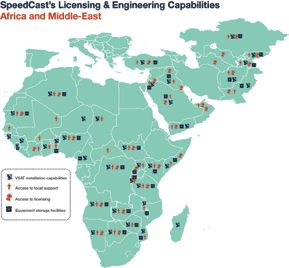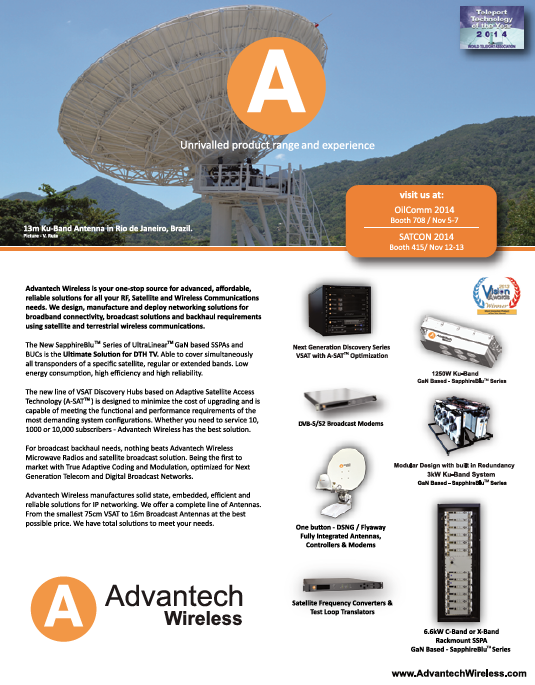Africa’s proven oil reserves have grown 120 percent in the past 30 years, from 57 to 124 billion barrels, with at least another 100 billion barrels forecasted to be discovered. Proven reserves of natural gas have grown 140 percent in that same time period.

This environment has created a most attractive resources market for foreign and global exploration companies. To date, there are approximately 300 foreign companies (excluding international Oil & Gas (O&G) giants such as Exxon Mobil, Shell, ConocoPhillips, and so on) exploring for oil & gas in Africa, both onshore and offshore, through approximately 600 projects. Furthermore, these explorers employ expertise and technology from hundreds of international companies for their engineering, procurement, construction and management (EPCM) services in the areas of geology, geophysics, rig vessels, offshore drilling, and more.
To support this diverse eco-system, a reliable communications backbone is critical to enable intra-company and inter-company collaboration. The telecommunications network serves as the link between drilling rigs, cargo ships, and operations onshore. That same network should also enable deployment conditions that allow for the optimal work and family balance by providing Information and Communications Technologies (ICT) that support seamless communication between staff who are working away from home, family and friends.
With applications such as Skype, File Sharing and Messenger services becoming a basic need, rather than a luxury, at remote sites, having a diverse bandwidth efficient communications platform is vital to the company’s overall operations success.
Although the global market offerings for land and maritime connectivity are extensive, the African and MENA regions present a unique environment for corporate and welfare communications, leaving the international exploration companies with a number of challenges that include...
Licensing
Africa and Middle East (MEA) as a region have strict regulatory frameworks for land VSAT technology. Most countries continue to protect the monopoly of their national telecom enterprise. In countries where private satellite services are allowed, the license fees are usually excessive, with up to 35 percent of ISP expenditures going toward VSAT license and monthly charges. This poses a challenge for international ISPs to rollout services in such complex policy and regulatory environments. As a result, international energy companies operating in the African-MENA region are often forced to use smaller, local providers with limited capacity and no added-value to the solution.

Service Quality + Reliability
This region’s telecommunications structure is still in a developmental stage, and while local service providers can effectively complement the terrestrial network for local needs, they often fail to keep up with the bandwidth-intensive global requirements of the international oil and gas explorers operating in the region, including:
• Reselling of bandwidth without any insight of its use
• Offering capped or limited bandwidth services
• No service availability or quality guarantees, resulting in frequent service downtime and equipment failures
• Lack of welfare and other value-added-services specific to the Oil & Gas industry’s needs
The primary connectivity challenges associated with remote exploration activities are:
1. Ensuring industry-specific applications are never compromised
2. Latest technologies enabling worker welfare are supported
3. All applications are continuously optimized to reduce ICT costs
4. Sufficient bandwidth capacity is available to meet current and future demand
Many local providers do not have the infrastructure to support the specific needs of international exploration companies, resulting in high bandwidth costs and poor crew welfare, especially in the offshore operations.
Overcoming Connectivity Challenges
In order to overcome the licensing and technology challenges posed by the local regulatory and socio-economic conditions, exploration companies should engage with a suitable service provider who offers a global infrastructure, one who is able to overcome the regulatory hurdles, and who is able to provide a complete turnkey solution, one that incorporates corporate and welfare needs, all at a competitive price.
Obtaining an operator’s license in the African-MENA region can be quite difficult. As a solution, many service providers turn to local partners to supply the end user with a license. In regions where this option is not legally possible, the service provider may assist the customer with their local knowledge and experience in negotiating with the local authorities.
The service quality and staff welfare challenges can be overcome by seeking an end-to-end communication solution which would simultaneously support corporate and welfare traffic. In addition, bandwidth management is required to save costs and allow for the use of bandwidth-demanding welfare applications, without compromising corporate traffic. The network design should also consider supporting workers’ existing devices, such as smart phones and tablets, as well as flexible in-room entertainment and information distribution systems.

A service which supports simultaneous, but separated, corporate applications and recreational traffic with managed bandwidth consumption will allow for staff welfare and staff retention, without compromising other corporate units.
When coupled with bandwidth management solutions, an efficient network design will bring the following benefits to remote operations:
Reduce ICT and overall operational costs... by effectively managing the most expensive asset in remote communications bandwidth. The correct solution will allow companies to obtain more out of their satellite bandwidth using a number of tools that should include WAN Acceleration, Caching & QoS (Quality of Service).
Improve worker retention ratio... by providing remote workers with the latest communication and entertainment technology to support improved working conditions, all without the need to add extra bandwidth.
Deliver an optimal balance... by striking a balance between corporate and recreational application delivery and budget. This keeps the workers happy, supports mission-critical applications, and effectively manages both costs.
Finally, the ideal solution should address the three aspects associated with an efficient communications service: developing the solution in-line with the customer’s network design requirements; achieving desired balance between CAPEX, OPEX and contract length; and maximizing total cost of ownership over the life of the service.
About the author
Edwin Haak is the Sales Director for Europe, Middle East and Africa and a seasoned satellite specialist at SpeedCast. Haak leads a team that supports the SpeedCast regional sales organization, which is focused on reinforcing the company’s competitive positioning and market share in land and maritime communications. Edwin has more than 20 years of international technical and senior management experience in the telecoms industries, with the last 12 years dealing directly with satellite communications.
Your Partner for Satellite Connectivity on Land or at Sea
SpeedCast has more than 30 years of experience delivering satellite networks, with an extensive worldwide infrastructure and global footprint. The company has deployed more than 100 welfare networks for governments, resource and logistics customers. Corporate welfare solutions range from Internet access for 10 men exploration camps to a network of vessels with video entertainment and wireless distribution to support the crews’ smart devices.
SpeedCast’s key network capability lies in the ability to optimize available bandwidth and ensure that neither the corporate or recreational data are compromised. The company’s satellite engineers developed an optimum mix of bandwidth optimization (WAN Acceleration, Caching, Protocol Control & QoS) and transparent customer network management tools that help end users use their bandwidth resources efficiently, which then leads to better cost controls.
SpeedCast has strategically invested in the major oil and gas hubs worldwide, including Europe, UAE, Australia, Malaysia and PNG, allowing us to provide a direct satellite link into any remote location in the world. This ensures maximum service reliability and low latency across all of our networks. SpeedCast has an integrated partner network in Africa and the Middle East and can support local licensing, equipment storage and support capabilities. This allows the company to rapidly extend any of their services to more than 80 percent of the region.
Recent Projects in the Middle East and African Regions
SpeedCast’s satellite networks have recently assisted in overcoming the challenges associated with O&G exploration in the Middle East region.
EPC Maritime Vessels in Africa: SpeedCast’s VSAT solution has also recently been adopted by Valentine Maritime, an UAE-based offshore construction company for their EPC project in the Persian Gulf. This redundant maritime service is based on a combination of Ku- and C-band platforms to ensure service availability and uncompromised Internet speeds and voice quality for both corporate and welfare needs. With the added benefit of SpeedCast’s SMART (Remote Monitoring) solution, Valentine Maritime now has centralized and remote access to their telecommunications assets within the SpeedCast network. This allows them to track their vessels and barges, manage bandwidth and control their security via a unified management dashboard.
“High quality telephony and Internet services support our crew satisfaction and welfare as well as operational efficiency,” said Jaya C. Raja, Head of Information System at Valentine Maritime. “Valentine Maritime had very specific requirements for our communications network. We wanted a backup solution for two of the three connected vessels and had a particular emphasis on clear VoIP connectivity. SpeedCast’s global maritime footprint and redundant infrastructure with their services already running on over 1,000 vessels and rigs worldwide made them the natural choice.”
There is more information available at the SpeedCast infosite: http://www.speedcast.com/


